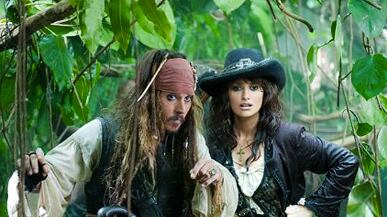Here's a challenging quiz for film fans: Quick! Name the most iconic scene in the last three Pirates of the Caribbean movies. Got it yet?
Maybe it's that one where Johnny Depp, as swashbuckling Captain Jack Sparrow, tah-dahs onscreen in kohl makeup and dreadlocks looking wild-eyed yet wily? Or the one where the rummy rapscallion swings down on a rope from a ship's mast, trying to escape an angry mob, before doing his signature Tiptoe Through the Tulips getaway dance?

Oh that's right. Captain Jack does those moves in just about every scene in all three movies. And nothing remotely explicable—let alone iconic, befitting a multibillion-dollar tent-pole franchise that has seared itself into the collective consciousness—unfolds between the films' opening cannonballs and closing credits.
Even with the fourth installment, Pirates of the Caribbean: On Stranger Tides, reaching theaters Wednesday after a splashy premiere at the Cannes Film Festival this week, you'd be forgiven for not being able to differentiate one Pirates movie from another. Or, for that matter, for not being able to recall specific lines of dialogue (with the possible exception of Geoffrey Rush in dishabille pirate drag bellowing "Arrrgh!") or characters' names beyond Depp's happy-go-lucky, Happy Meal-inhabiting creation, Jack Sparrow.
That's because it's almost universally agreed that each Pirates movie is instantly forgettable on its own terms, and for all their expensive, Jerry Bruckheimer-produced bombast, Olde World-y set decoration, and exotic locales, the films don't make a lick of sense. "They all run together, they all merge, and they're not significant in cinema history," says David Thomson, author of The New Autobiographical Dictionary of Film. "They throw a lot of money at them, add special effects for horror characters, pretty women—and you still can't remember a thing."
How else but for a kind of willful amnesia and collective embrace of cinematic dreck do you explain the popularity of the third chapter, Pirates of the Caribbean: At World's End, a blunderbuss of untied plot threads in nearly three hours of critically drubbed suckitude that still clocked $963 million in global ticket receipts?
Not even the parties responsible for making the films—which have combined to gross a staggering $2.7 billion worldwide—fully grasp what's going on. In a recent interview, Depp related on-set conversations he'd had with Gore Verbinski, director of the first three films. "I remember talking to him at certain points during production of 2 or 3, and saying: 'I don't really know what this means.'" Depp said. "[Verbinski] said, 'Neither do I, but let's just shoot it.' This guy is this guy's dad, and this guy was in love with this broad. It was like, 'What?'"
Hammerhead shark-men dripping with seaweed. A voracious giant squid sucking a pirate ship down to Davy Jones' locker. Keira Knightley and Orlando Bloom sucking face in front of a Windex-blue ocean. An armada of sand crabs hefting a landlocked ship on their backs. The non-sequitur sum of the movies' parts can be overwhelming. Yet each of the four films follows a boilerplate narrative progression.
First comes the set-up: Characters spout gibberish dialogue in a quasi-English/half-drunk pirate accent that no one (save, perhaps, four-peat screenwriting offenders Terry Rossio and Stuart Beattie) can understand. Then, with character exposition out of the way, a chase sequence inevitably follows—usually involving Sparrow swinging down from said mast on said rope—leading up to a multi-gagillion-dollar waterlogged set piece involving jousting skeletons or something. Gibberish, chase, set piece. Gibberish, chase, set piece. Lather, rinse, repeat.
Not even the parties responsible for making the films—which have combined to gross a staggering $2.7 billion worldwide—fully grasp what's going on.
Which brings us to Pirates of the Caribbean: On Stranger Tides, so far the best-reviewed Pirates movie to date (more on that in a minute), with a box-office expectation to match: north of $114 million in its opening weekend, according to pre-release tracking. In addition to being the first edition of Pirates to boast tacked-on, subpar 3-D effects, On Stranger Tides can be viewed as something of a reboot for the series by dint of its director: Oscar-nominated Rob Marshall. He catapulted into cinema from the Broadway musical world on the strength of his 2002 film version of Chicago. But after back-to-back flops with Memoirs of a Geisha and Nine, the director languished in movie jail until Disney hired him to bring narrative cohesion to the Pirates franchise.
Whether or not he succeeds with On Stranger Tides remains a source of open contention. Depp and Bruckheimer rained bro hugs of congratulations on Marshall at every Cannes photo op, and yet the rank and file of movie critics who have seen the new Pirates have been so far giving it a collective "meh" as opposed to a straight-up thumbs down.
The film's action follows Captain Jack as he's press-ganged into service helping piratedom's most fearsome privateer, Blackbeard (played by Deadwood's luminous Ian McShane.) Their mission: Find the Fountain of Youth in a bid to thwart the men's shared nemesis Barbossa (Rush) who's hell-bent on shivering Blackbeard's timbers under the employ of King George II, who wants the Fountain for himself. Penelope Cruz subs in for Knightley as the movie's token female presence, portraying a pirate princess who provokes "stirrings" in Depp's character—and who may or may not be Blackbeard's daughter. Also along for the bumptious 137-minute ride, a personality-deprived priest and equally po-faced mermaid (respectively played by Sam Claflin and Astrid Berges-Frisbey) who will no doubt factor heavily into On Stranger Tides' sequel.
But abandon all hope ye who expect Marshall to work miracles with the franchise. What motivates Depp and Cruz's characters to ford jungle streams or high-dive from waterfalls is still beyond even the realm of pirate delirium. Guys with horrible dental hygiene still chew scenery and gibberish still unvaryingly stands in for dialogue.
If most of the scenes in the PG-13 movie are so forgettable as to render a kind of quick-acting filmic amnesia, On Stranger Tides offers an eye-popping sequence that stands out for all the wrong reasons.
Captain Jack, et al. drop anchor at a place of nautical dread called White Cap Bay to snare a mermaid; the Fountain apparently requires a tear from such a creature to trigger its waterworks. Even knowing full well the half-fish/half-Victoria's Secret model's mythical potential to lure mariners to their doom, the crew is shocked when a school of mermaids goes Terminator on them, attacking with bullwhip-like sea lassos, sprouting wolf fangs and tearing the pirates to shreds with honey badger gusto. You'd be wise to cover the kids' eyes at this point. The ragged seamen respond with harpoons and by pouring cauldrons of burning whale oil on the violent harpies, resulting in an agonizing blood frenzy that seems out of place in a film targeting the 'tween demographic.
As a kind of sly aside, though, Depp turns in the most extravagantly swishy performance as Captain Jack that he has delivered to date. In what seems like an implicit homage to the Vanity Fair interview from earlier this year—in which the actor described upsetting Disney honchos by telling them "all my characters are gay"—Depp's On Stranger Tides-edition Sparrow gets razzed for being effeminate several times and in one scene is impersonated by a woman.
To his credit, Marshall comes closer to realizing a Pirates film that actually makes sense since Verbinski's maiden voyage with the theme-park ride-turned-franchise. But Marshall's improvements in linear storytelling come with downsides, too. On Stranger Tides stands as the least fizzy, least freewheeling chapter in the quartet of films precisely because its freak flag flies so low.
For his part, Depp—who pocketed $35 million for his performance—made clear at a Cannes press conference that he and the studio will keep on churning out Pirates movies as long as a billion-dollar-per-film haul remains theirs for the taking.
"Really, ultimately and truly, these films are made for the people that go in and pay their hard-earned money to see these things," Depp said. "And if the people get tired or something, that's when it stops."
Chris Lee is a senior entertainment writer for Newsweek/The Daily Beast. He previously worked as an entertainment and culture reporter for the Los Angeles Times. His work has also appeared in Vibe, Premiere and Details magazines and has been plagiarized in The Sunday Tribune of Ireland and The Trinidad Guardian.





